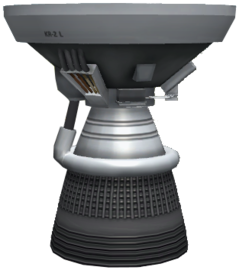Difference between revisions of "Kerbodyne KR-2L+ "Rhino" Liquid Fuel Engine"
(Updated.) |
Anaxagoras (talk | contribs) (rephrase, use modern names for other engines) |
||
| (10 intermediate revisions by 10 users not shown) | |||
| Line 1: | Line 1: | ||
{{:Kerbodyne KR-2L Advanced Engine/Box}} | {{:Kerbodyne KR-2L Advanced Engine/Box}} | ||
| − | The '''Kerbodyne KR-2L+ "Rhino" Liquid Fuel Engine''' is an extra large [[liquid fuel engine]] which has a high [[specific impulse]] | + | The '''Kerbodyne KR-2L+ "Rhino" Liquid Fuel Engine''' is an [[Radial size|extra large]] [[liquid fuel engine]] which has high thrust and a high vacuum [[specific impulse]]. In atmosphere, its specific impulse is lower than other high thrust engines like the [[RE-M3 "Mainsail" Liquid Fuel Engine|Mainsail]]. But in vacuum, the Rhino's I<sub>sp</sub> matches the efficient [[T-1 Toroidal Aerospike "Dart" Liquid Fuel Engine|Dart]], and is only outdone by the [[LV-909 "Terrier" Liquid Fuel Engine|Terrier]], [[LV-N "Nerv" Atomic Rocket Motor|NERV]], and [[RE-L10 "Poodle" Liquid Fuel Engine|Poodle]], which have respectively just 3%, 3%, and 12.5% of the Rhino's thrust. |
| − | + | Unlike the [[S3 KS-25x4 "Mammoth" Liquid Fuel Engine|Mammoth]], which is the only engine with higher thrust, the Rhino has an attachment node on the bottom. This, along with its high vacuum I<sub>sp</sub> and thrust, makes the Rhino a very useful engine for high-mass upper stages. | |
| − | + | The ''KR-2L'' might be a reference to the [[w:J-2X|J-2X]], an upper stage engine that was intended for the cancelled [[w:Constellation Program|Constellation program]] and later proposed for the [[w:Space Launch System|Space Launch System]]. | |
| + | |||
| + | Though each engine only counts as one part in-game, since the [[S3 KS-25x4 "Mammoth" Liquid Fuel Engine|Mammoth]] is composed of four [[S3 KS-25 "Vector" Liquid Fuel Engine|Vector]] engines, and the [[LFB KR-1x2 "Twin-Boar" Liquid Fuel Engine|Twin-Boar]] uses two KR-1 engines, the Rhino is technically the largest single engine in the game. | ||
== Product description == | == Product description == | ||
| Line 11: | Line 13: | ||
== Changes == | == Changes == | ||
| + | ;[[1.2]] | ||
| + | * Specific impulse at sea level decreased from 255 to 205. | ||
;[[1.0.3]] | ;[[1.0.3]] | ||
* Cost increased from 21000 to 25000, mass increased from 8.5 to 9, specific impulse at sea level increased from 170 to 255. | * Cost increased from 21000 to 25000, mass increased from 8.5 to 9, specific impulse at sea level increased from 170 to 255. | ||
Latest revision as of 19:36, 3 October 2023
| Kerbodyne KR-2L+ "Rhino" Liquid Fuel Engine | ||
| Liquid fuel engine by Kerbodyne | ||
| Radial size | Extra large | |
| Cost | (total) | 25 000.00 |
| Mass | (total) | 9.000 t |
| Drag | 0.2 | |
| Max. Temp. | 2000 K | |
| Impact Tolerance | 7 m/s | |
| Research | | |
| Unlock cost | 68 000 | |
| Since version | 0.23.5 | |
| Part configuration | part.cfg | |
| Maximum thrust | (1 atm) | 1 205.88 kN |
| (vacuum) | 2 000.00 kN | |
| Isp | (1 atm) | 205 s |
| (vacuum) | 340 s | |
| Fuel consumption | 119.97 | |
| Thrust vectoring | 4 ° | |
| Electricity generated | 12.0 ⚡/s | |
| Testing Environments | ||
| On the surface | Yes | |
| In the ocean | Yes | |
| On the launchpad | Yes | |
| In the atmosphere | Yes | |
| Sub-orbital | Yes | |
| In an orbit | Yes | |
| On an escape | Yes | |
| Docked | No | |
| Test by staging | Yes | |
| Manually testable | Yes | |
The Kerbodyne KR-2L+ "Rhino" Liquid Fuel Engine is an extra large liquid fuel engine which has high thrust and a high vacuum specific impulse. In atmosphere, its specific impulse is lower than other high thrust engines like the Mainsail. But in vacuum, the Rhino's Isp matches the efficient Dart, and is only outdone by the Terrier, NERV, and Poodle, which have respectively just 3%, 3%, and 12.5% of the Rhino's thrust.
Unlike the Mammoth, which is the only engine with higher thrust, the Rhino has an attachment node on the bottom. This, along with its high vacuum Isp and thrust, makes the Rhino a very useful engine for high-mass upper stages.
The KR-2L might be a reference to the J-2X, an upper stage engine that was intended for the cancelled Constellation program and later proposed for the Space Launch System.
Though each engine only counts as one part in-game, since the Mammoth is composed of four Vector engines, and the Twin-Boar uses two KR-1 engines, the Rhino is technically the largest single engine in the game.
Product description
| “ | This engine is Kerbodyne's first attempt at a highly advanced engine. The engineers couldn't get it to produce full efficiency at sea level without the engine exploding, so it was repurposed as an upper stage engine. The experience gained here with high efficiency has been repurposed for later models, which feature multiple combustion chambers at higher pressure (that don't go boom). This engine is optimized for lighting mid-flight, although it still provides respectable power at sea level. — Kerbodyne |
” |
Changes
- Specific impulse at sea level decreased from 255 to 205.
- Cost increased from 21000 to 25000, mass increased from 8.5 to 9, specific impulse at sea level increased from 170 to 255.
- Cost increased from 2850 to 20850 (and made meaningful)
- Initial release
